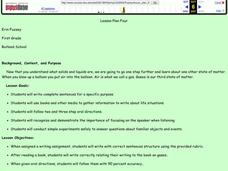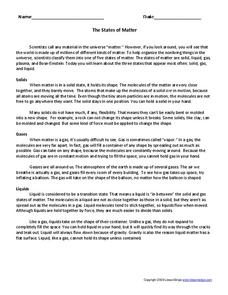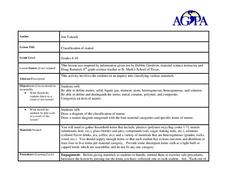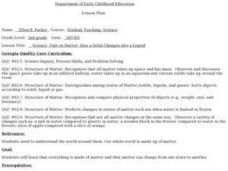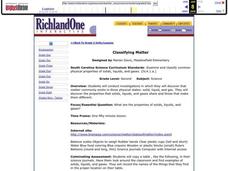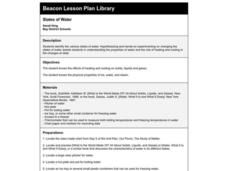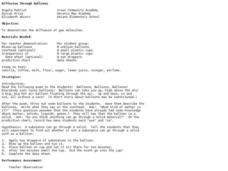Curated OER
States of Matter
By viewing this PowerPoint your students' understanding of molecular energy should increase. The properties and inter-particular forces are summarized. The logical progression of information is useful, but more data to demonstrate...
Curated OER
Matter
First graders are read a story about the various stages of matter with a focus on gases. Using a ziploc bag, they capture as much air as possible and discuss how it takes up space even though it is invisible. To end the lesson plan, they...
Curated OER
Putting the Ice in Hockey
Eighth grade physical science classes examine why the ice on which hockey is played is slippery. They do so by discussing phases of matter and the molecular motion in each. They read an article on a website and write out answers to 10...
Curated OER
Activity #15 What Happens To A Liquid As Energy Is Added?
Pupils model the arrangement of particles in a liquid. They use the model, to demonstrate how a gas is formed from a liquid with no increase in temperature as energy is added. Pupils model the arrangement and movement of gas particles.
Curated OER
The Ideal Gas
In this ideal gas worksheet, students read about the conditions necessary for an ideal gas to exist. They also read about the deviations from the ideal gas situation and answer four questions about ideal gases.
Curated OER
Behavior of Liquids and Gases
For this liquids and gases worksheet, students review 9 vocabulary terms associated with liquids and gases by completing a crossword puzzle.
Curated OER
A Chemical Curiosity
In this chemical change worksheet, students review physical changes such as evaporation and condensation before working with chemical change. They conduct an experiment with vinegar and baking soda before recording the chemical changes...
Curated OER
The States of Matter
In this states of matter worksheet, students learn about the 3 different states of matter and how matter shifts states. They then answer the 20 questions in the packet. The answers are on the last page.
Curated OER
THE WONDERFUL WATER CYCLE
Students are introduced to the processes of evaporation and condensation as they observe physical changes in water. They observe how matter changes from a solid to a liquid state. Students are explained that steam is water in its gaseous...
Curated OER
Solutions and Suspensions
Learners explore matter by conducting an in class demonstration. In this liquid mixture lesson, students identify the difference between a solution in which a solid dissolves into liquid, and a suspension where the solid doesn't dissolve...
Curated OER
Crystals
Young scholars investigate patterns in solids, the structures of crystals and rocks made up of minerals. For this crystals lesson plan, students review solids, make patterns with Styrofoam balls, make crystals in the lab and observe...
Curated OER
Science: Changes in Matter
Second graders discover what changes occur in various types of matter under different conditions. They make predictions about the changes in an apple left out in the air, water placed in a freezer, and a nail left in a cup of water. They...
Curated OER
Thermochemistry
In this thermochemistry worksheet, students indicate whether the given processes are endothermic or exothermic reactions. Students complete the phase change diagram as well as define a given set of vocabulary words. Students calculate...
Curated OER
Classification of Matter
Learners investigate common household items and classify them into types of matter. In this matter lesson, students group given items into categories based on their characteristics. They also complete a concept map about matter and...
Curated OER
Science: How Solids Become Liquids
Second graders discover how matter changes from one state to another by observing melting ice cubes. They decide on means to warm the ice and predict what will happen. Students record how long it takes for the cubes to melt.
Curated OER
Classifying Matter
Second graders conduct investigations to explore matter. In this states of matter instructional activity, 2nd graders complete four activities to analyze the three states of matter. Students analyze the properties of solids, liquids, and...
Curated OER
Sugar in Tea
Little chemists address whether or not you can get sugar back out of tea after it has dissolved. The PowerPoint itself simply walks them through the questioning process, considering different possibilities. The final slide settles on...
American Chemical Society
Can Gases Dissolve in Water?
Why does soda fizz when opened? Learners discuss the appearance of bubbles in soda bottles when opened. In groups, they design and complete an experiment comparing the amount of carbon dioxide dissolving in cold versus hot liquids.
Curated OER
STATES OF WATER
Students identify the various states of water. They use hypothesizing and hands-on experimenting on changing the states of water, the properties of water, and the role of heating and cooling in the changes of state.
Curated OER
Diffusion Through Balloons
Students observe the diffusion of air molecules through a balloon. In this chemistry and molecules lesson, students fill balloons with air and a scented substance and observe whether the scented air is able to permeate the balloon.
Curated OER
Science: The States of Matter
Third graders conduct experiments in matter to create chemical changes resulting in gases. By mixing solids and liquids, they create a chemical reaction and capture the gas in balloons. After observing the balloons fill with carbon...
American Chemical Society
Air, It's Really There
Love is in the air? Wrong — nitrogen, oxygen, and carbon dioxide are in the air. The final lesson plan in the series of five covers the impact of temperature on gases. Scholars view a demonstration of gas as a type of matter before...
NASA
States of Matter
Water, one of the basic needs of humans, is found in all three states of matter on Earth; no other planet—that we know of—possesses this quality. Here is a unit that allows learners to explore through experimentation what it takes to...
Curated OER
Water 3: Melting and Freezing
Students understand that most substances may exist as solids, liquids, or gases depending on the temperature, pressure, and nature of that substance. This knowledge is critical to understanding that water in our world is constantly...
Other popular searches
- Solids Liquids and Gases
- Solids Liquids Gases
- Solids, Liquids, Gases
- Solids, Liquids and Gases
- Pictures Solids Liquids Gas
- Solids, Liquids, and Gases
- Solids Liquids Gases Quiz
- Solids Liquids Gasses
- Matter Solids Liquids Gases
- Science Solids Liquids Gases
- Solids Liquids and Gasses
- Colloids Solids Liquids Gas



